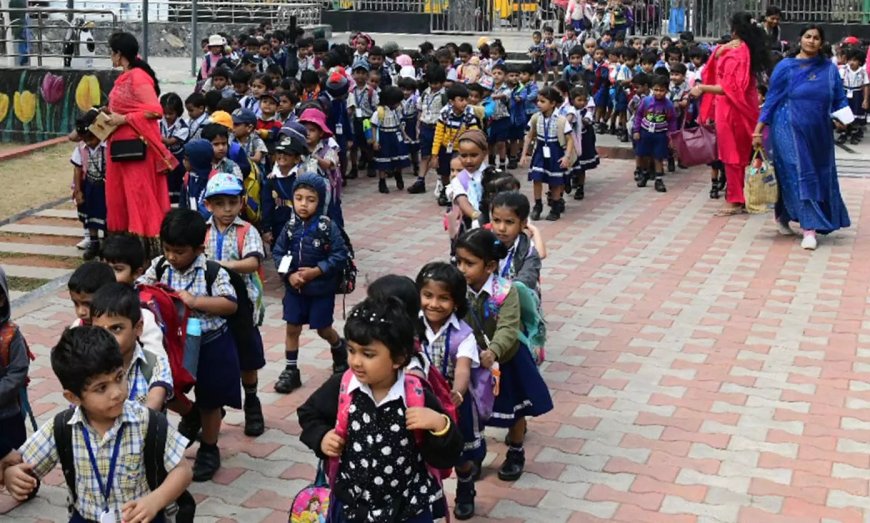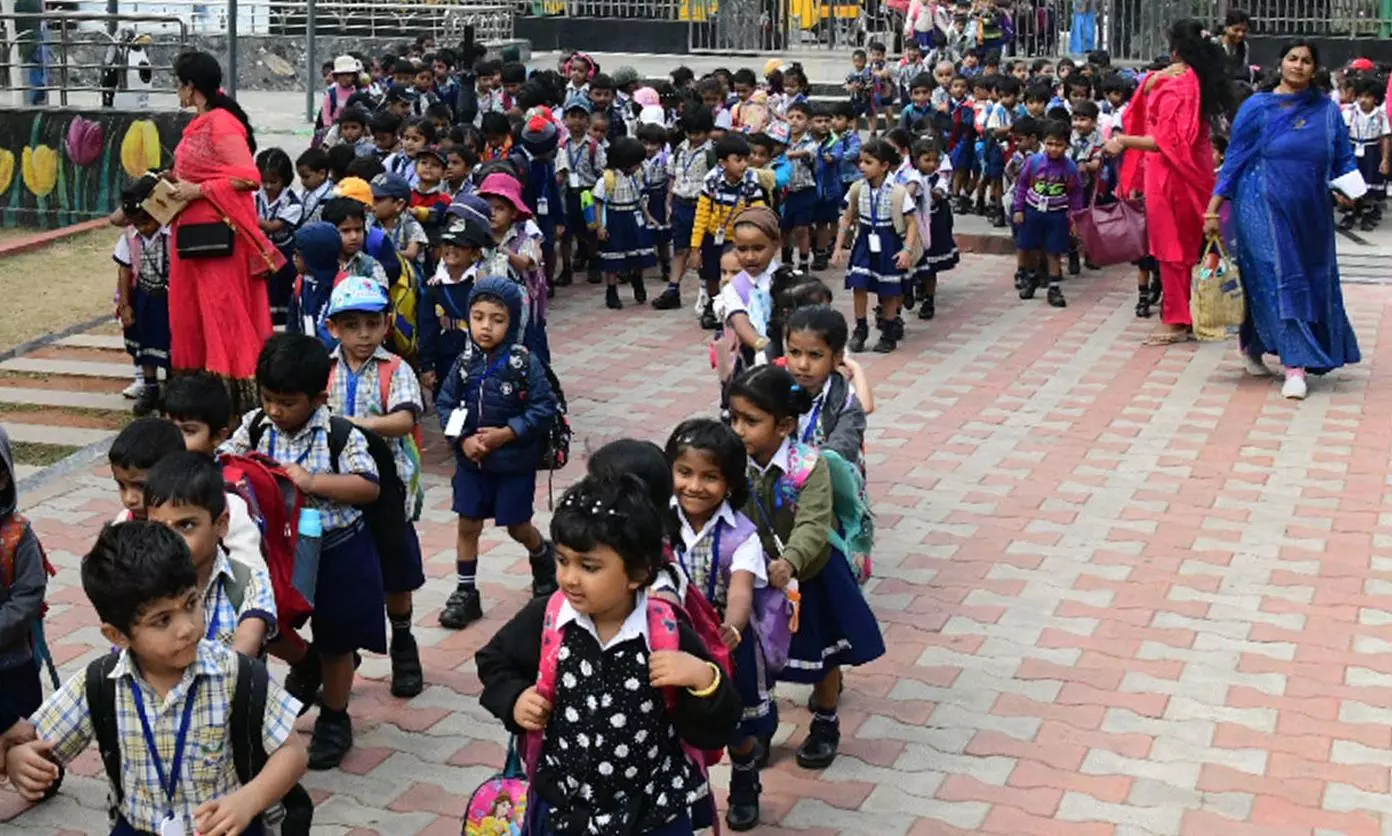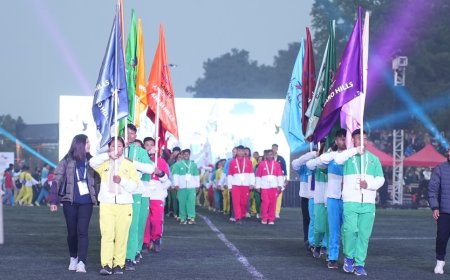Parents Struggle as Government Fails to Control School Fees
Hyderabad: Parents in Hyderabad are feeling the pinch as nursery admissions for the next academic year get underway. Schools, especially private and international ones, are demanding fees that stretch far beyond what most families consider unreal for enrolling a three-year-old. Despite repeated promises by the Telangana government to regulate school fee structures, there has been no government order released so far. At Jubilee Hills High School, nursery tuition alone costs Rs.1.68 lakh for the year, paid in three terms. Delhi Public School charges Rs.1.63 lakh, not including books, uniforms, transport and other extras. This fee structure is common for most renowned private schools like HPS, Meridian and others. Among the more affordable ranges too, parents seem to pay Rs.8,250 a month for nursery, LKG and UKG, which works out to almost Rs.1 lakh annually. In some international schools, the total crosses Rs.2.5 lakh. “We’re talking about three-year-olds. It’s absurd,” said one parent. “If this is how much we’re paying now, what’s next?” In May 2024, erstwhile principal secretary of the education department Burra Venkatesham announced plans to regulate school fees following mounting complaints from parents. The proposal promised a comprehensive cap on fee hikes, mirroring laws already in place in Tamil Nadu, Karnataka and Maharashtra. Parents hoped for immediate implementation, but the government clarified that any changes would only apply from the 2025–26 academic year. By September 2024, the directorate of school education, following orders from a Cabinet Sub-Committee, began considering recommendations from the 2017 Tirupathirao Committee report. The committee proposed that private schools could increase fees by no more than 10 per cent annually, with mandatory records of expenses beyond this cap. The government also hinted at introducing a special law to regulate fees and penalise schools for inflating costs for unnecessary projects disguised as “development charges.” But, as months passed, the government order remained pending. In December, when a new principal secretary took charge, schools had already opened admissions, some even closed them. Bharatiya Vidya Bhavan (BVB), for example, finished its registration process this month with a draw of lots scheduled for December 31. Admissions for BVB closed earlier this month, with parents paying Rs.1,000 for registration and participating in a draw of lots scheduled for December 31. Though this model is transparent, it remains an exception. Most private schools continue to operate without clear fee disclosures, often demanding deposits or other unexplained charges. A member of the Hyderabad School Parents Association (HSPA) said, “We have been fighting this issue for years. The government makes promises but doesn’t follow through. Even if they do, schools don’t seem to care.” Today, over 11,000 private schools in Telangana cater to nearly 35 lakh students and many of them raise fees each year without much notice or explanation. Some schools claim development expenses for things like smart boards or classroom upgrades, but parents question whether these improvements justify yearly hikes of 20-25 per cent. The government’s plans include penalties of Rs.5 to Rs.10 lakh for schools that break the rules. They’ve also floated ideas like capping fee increases at 10 per cent and requiring schools to explain expenses if they want to go higher. On paper, it looks promising. In reality, with another academic year starting, families are still waiting for relief.


Hyderabad: Parents in Hyderabad are feeling the pinch as nursery admissions for the next academic year get underway. Schools, especially private and international ones, are demanding fees that stretch far beyond what most families consider unreal for enrolling a three-year-old. Despite repeated promises by the Telangana government to regulate school fee structures, there has been no government order released so far.
At Jubilee Hills High School, nursery tuition alone costs Rs.1.68 lakh for the year, paid in three terms. Delhi Public School charges Rs.1.63 lakh, not including books, uniforms, transport and other extras. This fee structure is common for most renowned private schools like HPS, Meridian and others. Among the more affordable ranges too, parents seem to pay Rs.8,250 a month for nursery, LKG and UKG, which works out to almost Rs.1 lakh annually. In some international schools, the total crosses Rs.2.5 lakh. “We’re talking about three-year-olds. It’s absurd,” said one parent. “If this is how much we’re paying now, what’s next?”
In May 2024, erstwhile principal secretary of the education department Burra Venkatesham announced plans to regulate school fees following mounting complaints from parents. The proposal promised a comprehensive cap on fee hikes, mirroring laws already in place in Tamil Nadu, Karnataka and Maharashtra. Parents hoped for immediate implementation, but the government clarified that any changes would only apply from the 2025–26 academic year.
By September 2024, the directorate of school education, following orders from a Cabinet Sub-Committee, began considering recommendations from the 2017 Tirupathirao Committee report. The committee proposed that private schools could increase fees by no more than 10 per cent annually, with mandatory records of expenses beyond this cap. The government also hinted at introducing a special law to regulate fees and penalise schools for inflating costs for unnecessary projects disguised as “development charges.”
But, as months passed, the government order remained pending. In December, when a new principal secretary took charge, schools had already opened admissions, some even closed them. Bharatiya Vidya Bhavan (BVB), for example, finished its registration process this month with a draw of lots scheduled for December 31.
Admissions for BVB closed earlier this month, with parents paying Rs.1,000 for registration and participating in a draw of lots scheduled for December 31. Though this model is transparent, it remains an exception. Most private schools continue to operate without clear fee disclosures, often demanding deposits or other unexplained charges.
A member of the Hyderabad School Parents Association (HSPA) said, “We have been fighting this issue for years. The government makes promises but doesn’t follow through. Even if they do, schools don’t seem to care.” Today, over 11,000 private schools in Telangana cater to nearly 35 lakh students and many of them raise fees each year without much notice or explanation. Some schools claim development expenses for things like smart boards or classroom upgrades, but parents question whether these improvements justify yearly hikes of 20-25 per cent.
The government’s plans include penalties of Rs.5 to Rs.10 lakh for schools that break the rules. They’ve also floated ideas like capping fee increases at 10 per cent and requiring schools to explain expenses if they want to go higher. On paper, it looks promising. In reality, with another academic year starting, families are still waiting for relief.






































